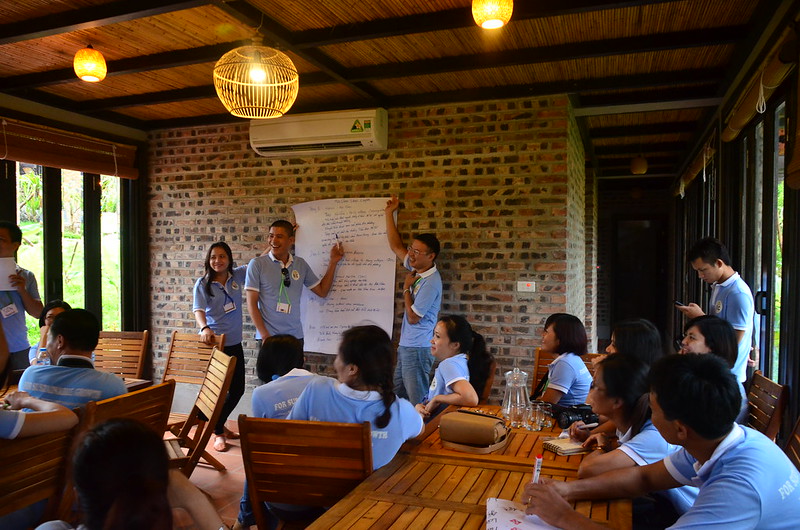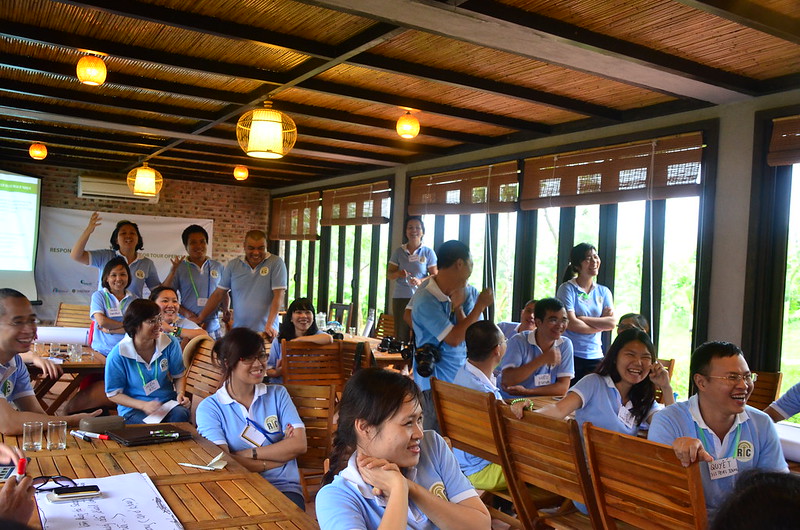On a shiny day of the summertime in Hanoi, the RTC team of 40 people from 13 different travel companies, and 3 tourguides has gone to Mai Chau Eco Lodge to brainstorm about the practices of travel companies in responsible tourism. The workshop is one of RTC’s educational programs throughout the year to support RTC’s members in understanding the defination of responsible tourism and from there improving responsible travel practices in their’ tour packages.
With support from destination host Mai Chau Eco Lodge, RTC 2-day workshop on “Responsible Tourism Practices for Travel Agencies” from 12-13 July 2014 has archieved great success with lots of ideas and opinions shared and debated.

RTC Deputy President, Ms.Truong Thi Hien presenting Responsible Tourism Projects in Vietnam
Responsible Tourism is not a new term to global tourism but still a new norm to most of tourism stakeholders in Vietnam. People might have heard about Responsible Tourism here and there but there is unlikely chance that all stakeholders understand who is doing what for responsible tourism in Vietnam. Besides RTC, there’s ESRT (Environmentally & Socially Responsible Tourism) Program who has set guidelines for stakeholders to follow; of which RTC’s members are seriously conducting and there’s WWF’s proposal to Vietnam National Administration of Tourism (VNAT) on implementing to certify responsible travel agencies based on a qualitative evaluation form.
Responsible Tourism could easily be mistaken with community based tourism, ecotourism and could be wrongly understood by responsible tourism implementers as purely using community based tourism is responsible disregard to evaluating how much to contribute to such community.

Group work to design a 3D/2N product in touristy area to minimize the negative impacts to destination
RTC has devided the team into 4 groups to work on building a new responsible product in touristy areas including Hạ Long Bay, Sapa, Mai Châu, Ninh Bình to find solutions for minimizng the negative impacts that mass tourism bring to those destinations with respect to community support, cultural preservation and environmental protection. The four teams broke down the value chain of each product to find down how to increase the share for local suppliers with regards to balancing the benefits for the community in a whole to sustain the developement and the quality of local products. In aditition,the cultural aspect is viewed in different perspective with a trong and constructive debate of each team on what it mean by preserving the local culture and customs. Developing the culture is the core solution for customs that are diminished by the ignorance of the audiance. Presenting classic cultures in a modern way is a way to touch the audiences’ heart.

All teams couldn’t wait to present their initiatives

3D/2N Sapa Responible Tour, one of the responsible tours that has been created at the workshop by team “ECO”

Enthusiasm in presenting a new responsible product in Mai Châu

Who says debate is not fun!
One of the guidelines for travel company is to choose responsible suppliers to integrate in the tour package to make sure every stakeholder in the supply chain conduct the responsible tourism guidelines. And accommodation is a critical knot in this chain. After inspecting Mai Châu Eco Lodge (MCE) with focus on what and how they have done and planned to eco-lize the lodge, the teams have sit down on a round table to discuss the the good, the bad and the ugly of MCE and pop up ideas on how to maximize the responsible practices at an accommodation.

Ideas for building a guidelines for accommodation
Mai Châu Eco Lodge has just joined RTC as a supporting member and their property has shown that they are qualified to join RTC team as a leading enterprise in conducting responsible practices such as wastewater treatment system for gardening irregation, solar panels for generating energy, 100% employees working at the lodge are locals. The lodge is still in its finishing stage and there are still lots to be done but Mr.Huy, MCE’s Director of Sales, has commited to RTC members in implementing ideas suggested from the workshop and has promised to report to RTC once a month of what they have done to improve the “eco” of the lodge.

RTC President, Mr.Đặng Xuân Sơn, handling the outcome after group discussion to MCE for their eco-improvement in the coming time
With MCE as an example for choosing a responsible accommodation supplier, RTC team has generated ideas for the guidelines for accommodation belonging to three major categories: Socio-economic responsibility, cultural responsibility and environmental responsiblity.

Sharing constructive feedback after the 2-day workshop

They are different individuals but they are in one team for one goal: All for a sustainable growth in Vietnam tourism
After 2-day of concentration, passion and enthusiasm and fun from all members, RTC responsible tourism guideline for tour operators has become more than regulations written down in a paper, it had became the practical thinking and the commitment of RTC’s travel company members.
Lan Chi









